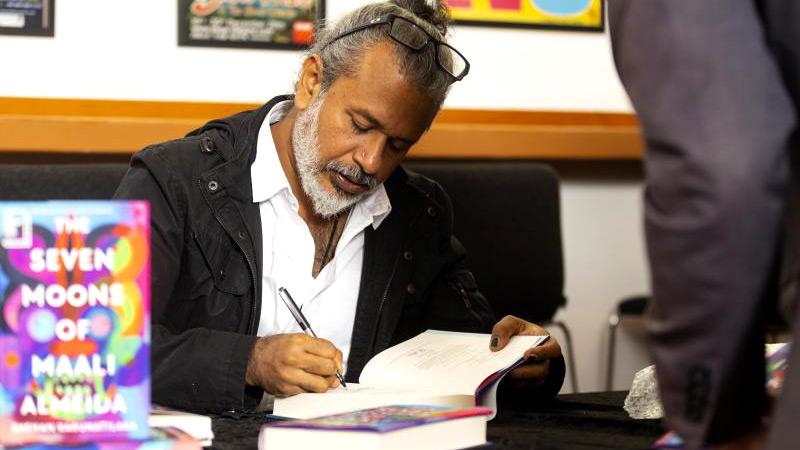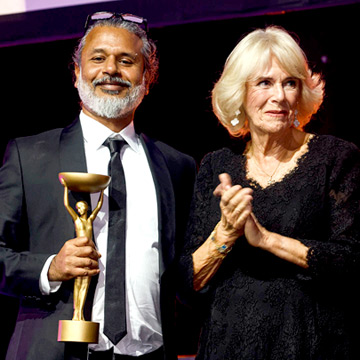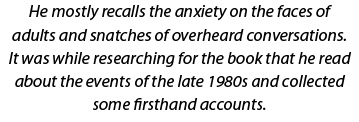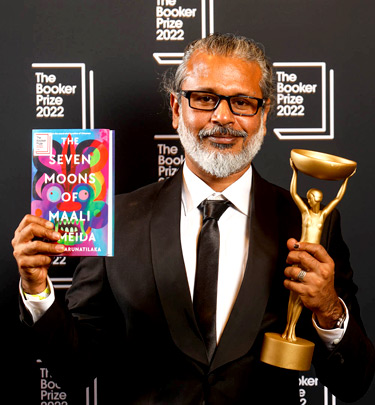

Living at a time where the daily dose of chaos and endless economic and political instabilities has become a lifestyle in Sri Lanka, the news of winning the prestigious and lucrative 54th Booker Prize by Shehan Karunatilaka for his remarkable novel ‘Chats with the dead’ aka ‘The Seven Moons of Maali Almeida’ was amazing and encouraging.
‘The Seven Moons of Maali Almeida’ is Karunatilaka’s second novel and his 2010 novel ‘Chinaman: The Legend of Pradeep Mathew’ won awards including the Commonwealth Book Prize which is frequently hailed as one of the greatest novels of the 21st century, and arguably the single greatest work of fiction involving cricket.
 Her Majesty The Queen Consort presents Shehan Karunatilaka with his trophy |
Effortlessly merging realism with fantasy, on Seven Moons of Maali Alieda Karunatilaka takes readers on a rollercoaster ride marked with dark humour and satire. “Is there life after death? What is it like?” Karunatilaka starts his novel with this witty yet surreal line where the protagonist Maali discovers the answers when he lands in the company of the dead: “Yes,” and “Just like here but worse.”
Maali, described as a “photographer, gambler, slut,” cannot fathom the cause or the nature of his death, and is worried about a set of photographs of alleged war crimes carried out by the Sri Lankan government in the early years of the country’s 1983-2009 battle against terrorism.
In a brief interview with the Sunday Observer weeks ago, Karunatilaka expressed his entry into writing a ghost story as his second book. “I’ve never met a ghost, but I’m pretty sure Sri Lanka’s is crawling with them. So the novel was an imagining of what Colombo’s dead would say if they had the chance to speak,”
Initial plot
 The initial plot for the ‘Seven Moons of Maali Almeida’ emerged in 2009 in post-war Sri Lanka. As Karunatilake emphasised the death of Richard de Zoysa, a well-known journalist, actor and poet who was abducted and killed in 1990, was the trigger for Maali’s character, and Karunatilaka began writing the novel in 2014.
The initial plot for the ‘Seven Moons of Maali Almeida’ emerged in 2009 in post-war Sri Lanka. As Karunatilake emphasised the death of Richard de Zoysa, a well-known journalist, actor and poet who was abducted and killed in 1990, was the trigger for Maali’s character, and Karunatilaka began writing the novel in 2014.
Recalling his initial impulse to explore the 1980s riots and life of Colombo and the relevance of that particular era in his life he says, “The 80s are recent enough for some of us to remember, but far enough back that you can write about them without getting into trouble. 1989, when the story is set, was a particularly complex time with the LTTE, the JVP, the Government and the IPKF all embroiled in brutal battles. It seemed logical to set a murder mystery and a ghost story in a time when innocents were being slaughted by all sides and swiftly forgotten.”
 Shehan Karunatilaka |
Growing up in Colombo, Karunatilaka was a teenager at that time and had little or no comprehension of the horror of war, other than that as he remembered it was bad enough to keep schools closed. He mostly recalls the anxiety on the faces of adults and snatches of overheard conversations. It was while researching for the book that he read about the events of the late 1980s and collected some firsthand accounts. “However, my wife’s family who lived in the plantations at the time had a far more terrifying experience,” he said.
Unique storytelling
Similar to ‘Chinaman’, the mode of storytelling is fairly different and unique in ‘Seven Moons of Maali’. The judges particularly admired the ambition of its scope and the hilarious audacity of its narrative techniques. Although it’s about discovering a mystery, the story brings out a fraction of political history in Sri Lanka and the revelation is done by a ghost.
“Sri Lanka is haunted by many ghosts. Even though the past decade has been a time of relative peace, the ghosts of our violent past still cast their shadows. As a nation we seem unsure of how to deal with these ghosts, whether to learn from them or forget about them,” Karunatilaka said.
‘The Seven Moons’ has a complex history with many rounds of edits. It was shortlisted for Sri Lanka’s Gratiaen Prize in 2015 under the title ‘Devil Dance’, and published in an earlier form as ‘Chats With The Dead’ in 2020. Gearing up for a global audience, the book went through further edits and made the Booker longlist of 13 books under its current title before its UK launch.
The afterlife of Maali is a noteworthy example of complex character development in storytelling. Explaining the process of how he built Maali’s story and his bizarre world, Karunatilaka said, “As a war photographer, the carnage Maali saw bore witness to shape his world view. He was an atheist who saw life as a lottery and a nihilist who saw no order to the universe. The afterlife I gave him was a labyrinth that mixed Buddhist, Hindu and Judeo-Christian mythology. Maali has to decide whether to deal with his past or discard it, whether to avenge wrongs or to forgive them.”
Influences
Cormac McCarthy’s ‘Blood Meridian’, Kurt Vonnegut’s ‘Galapagos’ and George Saunders’ ‘Lincoln in the Bardo’ were the books Karunatilaka read and re-read throughout the writing of the last few drafts of ‘Seven Moons of Maali’.
“‘Blood Meridian’ is a carnival of violence, a hard-boiled Western about Cowboys and Indians and Mexicans scalping each other. Even though its politics and world view are uncomfortable, the visceral beauty of the prose makes it hard to look away. The other two feature talking ghosts and have enough humour in them to counterbalance McCarthy,” Karunatilaka said.
Booker winner
Born in 1975, Karunatilaka grew up in Colombo and studied in New Zealand before working for more than 20 years as an advertising copywriter, and his songs, scripts and stories have been published in ‘Rolling Stone’, ‘The Guardian’, ‘GQ’ and ‘National Geographic’.
The Booker Prize is the leading literary award in the English speaking world, and has brought recognition, reward and readership to outstanding fiction for five decades. This is the second time a Sri Lankan author won this award. Michael Ondaatje won the Booker Prize in 1992 for his novel ‘The English patient’.
Shehan Karunatilaka was awarded this prestigious honour on October 17. It was presented by Queen Camilla, with a keynote speech by singer-songwriter Dua Lipa at a ceremony hosted by comedian Sophie Duker.
